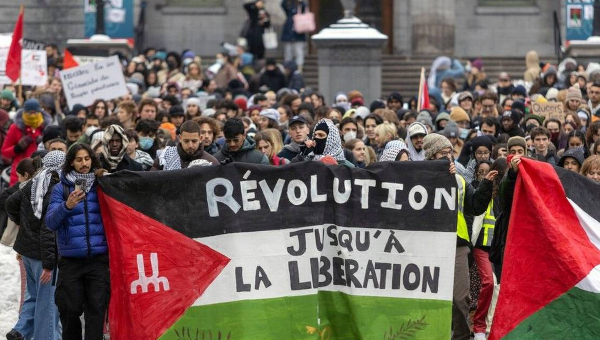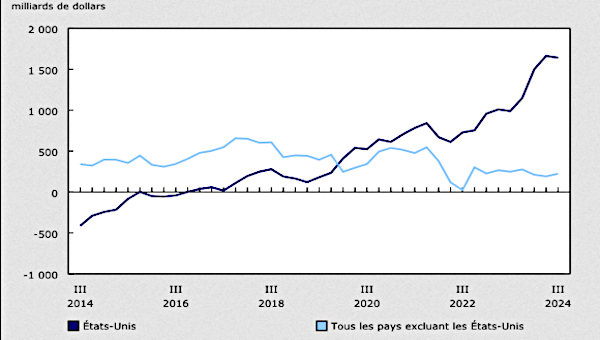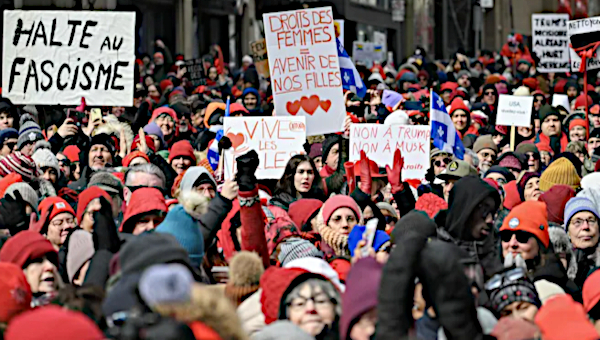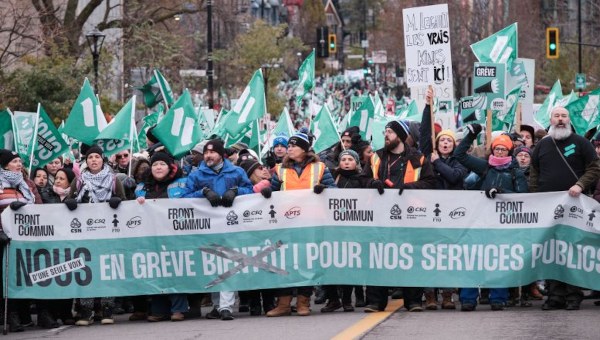The Quebec Mix: Racism, French, Austerity, Climate, Biodiversity
An emerging anti-capitalism which heralds the convergence of struggles
The televised English debate during the federal elections (September 9, 2021) began with the controversial question to Bloc Québécois leader Yves-François Blanchet: “You denied that Quebec has problems with racism yet you defend legislation such as bills (sic) 96 and 21, which marginalize religious minorities, anglophones and allophones. Quebec is recognized as a distinct society, but for those outside the province, please help them understand why your party also supports these discriminatory laws.” According to one poll, the majority of English Canadians in the country judged the question to be appropriate, while the majority of Quebecers considered it “Quebec bashing.” But few people questioned the amalgamation of Law 21 and Bill 96.
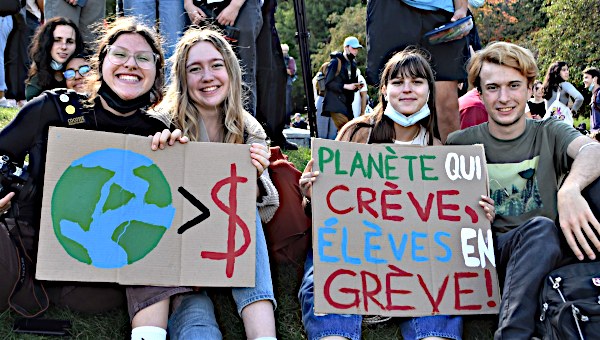
From the “catho-secular” Law 21 to the defeatist and twisted Bill 96
Law 21 prohibits the wearing of religious symbols by teaching staff and certain other persons in positions of authority. In the real political context, it targets the right to work of veiled women under the pretext of secularism. If it really promoted secularism, this law would have eliminated the generous subsidies to private religious schools, of which Catholic schools are by far the most numerous, and it would have put an end to the tax privileges of religious organizations which mainly benefit the Catholic Church. Finally, its regulations would no longer tolerate the presence of crucifixes in the buildings of the school systems and hospitals. It makes one wonder if the current government of the Coalition Avenir Québec (CAQ) has not especially offered a gift to its Catholic base in the form of “catho-secularism.”
The great majority of the Québec solidaire delegates rejected Law 21 in convention despite the hesitations of the party’s deputies in the National Assembly, more concerned with the electoral conquest of the French-speaking suburbs and regions. This resulted in the party’s organized absence from demonstrations called by minority organizations against this law.
Bill 96 claims to strengthen certain aspects of Law 101 (Charter of the French language) watered down along the way by the Supreme Court of Canada. It does so by confusing even more the byzantine nature of Law 101 with its recognition of a right of linguistic privileges of the richest and historically conquering native English-speaking minority. This recognition, internalized by the radical and even Marxist left, not only justifies the existence but also crystallizes the more advanced development of the English-speaking education and health systems as well as of its wealthy Montreal West Island municipalities which have instrumentalized the provincial Liberals to reject the one-island-one-city amalgamation. We are a far cry from the great French McGill demonstration of 1969.
This capitulation, internalized by Bill 96, often produces aberrant results, such as reinforcing the elitist character of English-speaking CEGEPs (colleges in Quebec) through a policy of quotas or imposing a French examination on allophones attending English CEGEPs but not on native English speakers. At the primary and secondary levels, anglophones will continue to enjoy free choice of the language of instruction, but not francophones and allophones. As a result, at the school level, anglophones enjoy a so-called right to choose their language of instruction and an unconstrained elitism. Are francophones making up for it in terms of the language of work? Can we really believe that the CAQ, which is committed to the law of capitalist competitiveness, will force medium-sized companies (25 to 49 employees) to apply costly francization programs or to find pretexts to hire bilingual employees? At most, companies will agree to the semi-francization of the facade and let a few zealous francophones laboriously try to prove, under the sarcasm of the main English-speaking media, either a discrimination in hiring or not to have been served in French in a business.
Language, a social relationship, is a national collective right, not an individual right
These linguistic privileges of the 1760 conqueror are guaranteed by the constitution of Canada under the pretext that language, a social relationship by definition, is an individual right whereas, in reality, it is a collective national right. This is the well-kept secret of the constitution of Canada and of its Charter of Rights, which are well adapted to the individualist neoliberal ideology: they ignore national collective rights as well as social ones. It is no coincidence that this charter, which the Quebec National Assembly unanimously rejected and which it still has not accepted, was proclaimed at the same time as global neoliberalism was emerging and a few years before the agreement of free trade between Canada and the US at the end of the 1980s.
The problem with the consequences is not the generalized bilingualism in Montreal, which is a cultural richness and an economic asset, but that the English-speaking minority, with some exceptions, identifies itself as the advanced bastion of the conquering majority. The CEO of Air Canada, living in Montreal for 14 years without deigning to learn French, crystallizes all this arrogance, as does the Government of Canada, which hires unilingual English immigration officers for its Montreal agency. This shows that the unilingualism of the Premier of New Brunswick, an official bilingual province, and the affair of the bilingualism of the judges of the Supreme Court were only an announcement of the anti-Quebec chauvinistic offensive to isolate Montreal from the rest of Quebec. The slightest corrective that we would expect from the federal government, as demanded by Québec solidaire, would be to subject companies under its jurisdiction, including Air Canada, to Law 101 as amended by the future Bill 96, however convoluted it may be.
Formal equality does not correct the real inequalities bequeathed by history
Considering the abstract egalitarian fashion of the federal government, shouldn’t the Indigenous, Acadian, and Franco-Canadian minorities have the right to their education and even health systems? Historically, these peoples and minorities reside and live on their national territories even if, as for the Quebec people, their territories have been conquered militarily. As peoples and minorities oppressed to the point that their languages are in decline and even often in perdition, it is legitimate for them to request and obtain schools in their languages, even outside their national territories, often left for economic reasons linked to their oppression. Poorly treated in hospitals, their demand for clinics and a hospital is legitimate.
Why not the English-speaking Quebec “minority”? Because it is an advanced bastion of the majority outside its national territory, and the omnipresent English is in no way threatened by their integration into the school system in another language. A portion of their lessons can be adapted to them while the majority are learning English, which as a language of international communication, they cannot do without. The same logic applies to inequalities between nations and nationalities, as well as to those between women and men, which require a policy of affirmative action.
Between Law 21 and Bill 96, not a common measure but a clear opposition
The inextricable and insoluble debate which ensues to stop the attraction of allophones and francophones toward the anglophone system hides the real goal of the Caquist bill, which is to amend the Canadian constitution Don Quixote style by affirming that Quebec is a nation, and that French is the common and official language. Before the elections, all parties in the federal parliament pretended to agree to this amendment, except the former Indigenous minister of British Columbia. To further complicate matters, this amendment provokes the ire of the Assembly of First Nations of Quebec and Labrador because it sweeps under the rug their mother tongues, which are in sharp decline, and for several nations marginalizes English as their language of use imposed by the federal Indian Act.
The reality is that there is a clear opposition, and not a commonality as the English debate issue suggests, between an effectively Islamophobic and sexist Law 21 and a Bill 96 which defends the constitutional reality of the Quebec nation, and of its language, albeit in an electoralist and opportunistic way, à la mode CAQ. Thus ignoring indigenous languages, to strengthen Law 101 against the invasive predominance of English which is not only the language of the dominant majority but also the global lingua franca of the neoliberal global economy and of the internet and social networks (in contrast to the weakening of French as a world language).
The Solidaire corrective is to amend the bill to strengthen French as a working language – more businesses covered, reinforcement of in-company learning, digital language – and to propose a parallel law on indigenous languages. Given the strong identitarianism of the CAQ, which clashes with its pro-business bias, should we not oppose Bill 96 until a guarantee is obtained for indigenous languages, as well as have the nerve to demand the wall-to-wall francization of the school and health systems as well as of the language of work under the supervision of unions and popular organizations, even if it means providing for a generous transition period?
The theory of settler colonialism makes the Quebec people and the French language disappear
The blind spot on the mismatch between Law 21 and Bill 96 both on the English-Canadian and Quebec majority side, but from an opposite point of view, hides from both sides the dialectic between the defense of the oppressed and the chauvinism of the oppressor which sandwiches the people of Quebec. Among the English-Canadian left, the prevalent contemporary reading of Canadian history is based on the theory of settler colonialism. This leads to the conflation of the Quebec people with the English Canadian people as a “white” people but who, unlike them, refuse to recognize their systemic racism despite the Quebec mosque massacre, the anti-black profiling of the police of Montreal, Repentigny and Val-d’Or, and the racism against indigenous people in hospitals, highlighted by the death of Atikamekw Joyce Echaquan and the Viens report.
This inherent Quebec racism, which finds its counterpart in English Canada and even more in the US, would come from its semi-feudal history and especially from the ideological and even political control of the Catholic Church until quite recently, which would explain the weakness of its democratic institutions which are not, moreover, sui generis but British ones. As if parliamentary democracy, a victory for popular struggles spanning two centuries, were inherent in capitalism as neoliberal ideology claims, while capitalism seeks only to restrict and repress it.
This theory of settler colonialism also meets with the assent of the vast majority of the non-French-speaking Quebec left, conditioned by the large English-speaking media and the buzz of social networks. More crucially, it penetrates a good part of the progressive francophone youth who did not experience the national struggles of the last half-century which ended with the referendum defeat of 1995 and was definitively closed with the said federal Clarity Act of the year 2000. In Montreal, unlike the union and popular demonstrations (housing, poverty, etc.) taking place mainly in French, the anti-racist demonstrations are either downright bilingual and even, particularly for the pro-indigenous ones, predominantly in English. As for climatic manifestations, they navigate between the two.
Turning the knife in the wound of a battered Quebec to hide an unavoidable capitalism
To paraphrase the famous Canadian sociologist Marshall McLuhan, “the language is the message.” Regardless of how true the speech is, not only does the message not get through or not get through well, but it hits head-on with the national sensitivity of Quebec when it is addressed in English. (Couldn’t even Greta Thunberg’s speech have been translated during her appearance?) It is understandable that when it is added that Montreal is an unconquered indigenous territory, while the sovereignty of the Quebec people is not even assured, the cup overflows. When the anglophone direction of the Montreal Canadiens hockey club, whose adulation unites both francophones and anglophones, affirms that they want to publicly recognize this fact before each game, the people of Quebec understand very well that this is a federalist message packaged for them by the predominantly English-speaking Montreal business class, spearheading the Toronto-Ottawa axis, a master in the art of divide and rule. It is a sad fact that several indigenous personalities in the Montreal region play, consciously or not, this petty game.
The dynamics of the popularity of the theory of settler colonialism combined with the deep retreat of the Quebec national struggle cause profound damage to the struggle of the Quebec people for their national liberation and social emancipation. In turn, this dynamic weakens the struggle of the working people of the Canadian state, allied with its many oppressed peoples, for the overthrow of capitalism enthroned on Wellington Street and reigning on Bay Street. The theory of settler colonialism dethrones the centrality of capitalism whose colonization is certainly a crucial historical aspect and whose divisive ideology continues in the form of racism and Quebec bashing because the Quebec people have also experienced a catastrophic conquest. This colonialism has often been understood by the left as having only a historical dimension as if it were not perpetuated in contemporary Canada and Quebec. This awareness requires a decolonization of mind, behaviour, and speech which leads to a reorientation of militant action.
The retreat of the Quebec national struggle did not wash away nationalism, the source of which is the national oppression inherent in the historical construction of the Canadian state, whether vis-à-vis the Quebec nation or vis-à-vis those Indigenous and Acadian nations, not to mention its deleterious effects on national minorities, particularly racialized ones, but also those who speak French. This retreat has led astray and shriveled the nationalism of the oppressed into a frightened identitarianism, reminiscent of the national-populist Duplessist era (1936-40, 1944-60), onto the backs of minority nationalities, of which the Arab-Muslim nationality, a category that can be extended as much as one likes, is the scapegoat, succeeding anti-Semitism, which is still alive and well, against a background of anti-black and anti-indigenous racism.
Will the identity division of the people and peoples prevail over that in social classes?
The poor state of the social struggle in Quebec is underlined by the failure of the Common Trade Union Front in the public sector, but not its crushing, to form for the first time since the 1960s. And it is highlighted in each poll by the relative popularity, particularly among francophones, of the identitarian CAQ, and recently, by the rapid rise of the openly anti-immigrant Conservative Party of Quebec (PCQ), a rightist split of the CAQ. As for the indigenous struggle, it did not recover from the defeat of the Wetʼsuwetʼen of British Columbia and that of the Mi’kmaq of Nova Scotia. The weak support of these struggles within the non-native population throughout Canada has also demonstrated the success of the national divisions fueled by Quebec bashing. The result is the stagnation of the Canadian political scene, which the results of the last Canadian election demonstrated, in particular, those of the NDP, a neoliberalized social democratic party, despite a marginal growth, especially compared to the great hope of 2011 based on the Quebec breakthrough that made this party the official opposition for the first time since its founding in the 1930s.
This division of identity in Quebec and Canada is in no way original compared to what is happening elsewhere in the world. On the right, fascist and far-right parties are rising, pushing those of the center-right and center-left to the right. The prolonged absence of a successful large-scale union and popular response for a generation has given way on the left to a democratic response against racism, xenophobia, and sexism of which the Black Lives Matter movement in the US and Canada is the standard bearer. This response is qualified as divisive “wokism” by the right, including by the premier of Quebec who used this qualifier toward Québec solidaire. There is a kernel of truth in this criticism in the sense that for lack of convergence of the oppressed groups among themselves and especially of these with the exploited proletarian mass in semi-dormancy, this response can turn into sectarianism against the popular majority for the greater joy of capitalism. This switch is theoretically consolidated by the theory of settler colonialism replacing the common capitalist target by the “white” people.
After the torpor of the pandemic, which remained threatening, the social struggle is starting again through the climate portal
To get off this false path leading to a strategic dead end, criticism is necessary but not sufficient, especially without an alternative, because it then plays the game of the right. Even more so since, on these grounds, the principled positions are either complex or clearly against the current of the identity-based vision of the society which masks the class-based one, although the Occupy movement popularized the opposition of the 1% with the 99%. The existential climate and biodiversity crises combined with the social crises of growing inequalities and poverty are the exit door, provided they are not used as a flight forward. The great popular mass of racialized and non-racialized people, native and non-native, francophone, anglophone and allophone, women and men, oppose, or at least are skeptical about, government business policies on these issues.
The current popular mobilizations in Quebec are made on these issues, such as the Fridays for the Future climate demonstrations of September 24 which brought together fifteen to twenty thousand people with a strike of more than one hundred thousand students despite the demobilizing effects of the pandemic. The contrast with the failure of the November 6 demonstration of the Trade Union Climate Front, with barely a thousand people in Montreal, was all the more striking. One cannot do otherwise than to note the ineptitude of the union bureaucracy, which was unable to organize not only a climate strike planned worldwide, but not even a large climate demonstration, where two years ago half a million people gathered. The validity that bureaucrats appear to give to the “just transition” is actually to pretend to lead the climate fight in order to slow it down with both feet.
Fortunately, the union movement can count on the strikes of daycare workers who gather over several days by the thousands or hundreds with concomitant strikes despite significant wage concessions from the government but with a reactionary extension to the 40-hour work week. This strike shows that public sector workers have not said their last word. As in the US, workers in the private sector are rising up, particularly those essential to the food companies Exceldor and Olymel, whose largely successful strike over several weeks hit the headlines without capitulating to the blackmail of large pig farmers supported by the CAQ. At the end of October, the Ministry of Labour counted more than 2,600 strikers, including workers at a Hilton hotel and paramedics, not to mention the sporadic stoppages of daycare workers.
The announcement of an anti-capitalist qualitative leap emerging from the climate fight
More importantly, perhaps, is the announcement of a qualitative anti-capitalist leap emerging from the climate struggle. François Geffroy, was one of the main organizers of the great climate demonstration of half a million people in Montreal with Greta Thunberg in September 2019. In an interview with André Noël:
“François Geffroy proposes to relaunch the fight for the climate on a whole new basis, by naming and directly confronting those responsible for the ongoing disaster, that is, the leaders of large corporations clinging to their privileges. We must begin degrowth now, he said, and this cannot be done without fighting capitalism, a system based on infinite, unjust and deadly growth.”
François Geffroy, still relatively unknown in the environmental movement despite being a co-founder of the organization “La planète s’invite au parlement,” takes a critical look at this event:
“We did not even dare to say that we were against the politicians in power. We invited them to walk with us. We were totally unable to name an opponent. We were there because we loved the planet. This demonstration illustrates our fear of fighting those responsible for the climate catastrophe” (André Noël, “Il est temps de nommer les adversaires dans la lutte pour le climat,” Pivot, 1/11 / 21).
This courageously initiated debate must be deepened. Although it is necessary to stop and radically reduce the scandalous consumption of billionaires and other multimillionaires, if not of the upper middle classes, and to allow an increase of consumption by the poorest world majority, as François Geffroy says, it is necessary to act for less of a transfer than of a mutation of this consumption. Manufacturing and upstream production as well as agro-industry, under the control of transnationals, which are the backbone of profit, must be drastically reduced if not completely eliminated. The means is the elimination of single-family and row housing, solo cars, animal products, planned obsolescence, fashion, communication (5G), and commercial hypertrophy including advertising. On the other hand, we need a drastic increase in services to the population, with those already public to be improved as well as those which must become so, especially in the strategic sectors of finance, transport and energy but also housing within the framework of land-use planning that maximizes active transportation and short journeys. The ecofeminist caring for people by public services essentially requires human energy and weaves a united (solidaire) society that replaces itself a hundredfold as a generator of well-being for the energy-intensive and carnivorous society of mass consumption.
Does the strategic anti-capitalist path pass to the eco-socialist state, through independence?
The adversaries to be named are certainly Bezos and Laliberté as well as the transnationals Apple and Disney, who do not even want Biden’s coughing Green New Deal. In fact, the rejection of capitalism, or its overcoming, as the Solidaire program to be dusted off on this point says, is more than the rejection of “all multinational corporations.” François Geffroy, very aptly, speaks of “reconnecting with the ideal of economic democracy, which was at the base of the socialist project,” but the governments and its political parties, in a word, the State, remain the blind spot of his analysis, at least in the interview cited, despite the interviewer’s hint. François Geffroy seems to advocate the expropriation of the means of production that lead to “barbaric capitalism which we were confronted with in the aftermath of the industrial revolution,” but where is the strategy that will lead to the necessary overthrow of the capitalist state? Is this possible only by elections in accordance with the practice of Québec solidaire? Its movementist militancy suggests something else but what? What role does Geffroy give to left-wing political parties in general, and to Québec solidaire in particular? Should we go through an (eco)socialist state?
“What role … to left-wing political parties in general, and to Québec solidaire in particular? Should we go through an (eco)socialist state?”
François Geffroy ignores the issue of independence, which it seems that nobody wants any more, except a few old beards of the PQ and a few “purzédurs” zealots in Québec solidaire. The existing Solidaire policy is disconnected from its strategy toward independence through the Constituent Assembly during the first mandate. The Solidaire priority is certainly the climate fight, which the party has been harping on about for the public at large, but it advocates a GHG reduction target of less than 45% for 2030 compared to 2010, which is less than the minimum level requested by the IPCC and barely equals the Ottawa pro bituminous oil and pro fracking gas, without an action plan to reach even this insufficient target. Except for the rejection of the ten-billion-dollar tunnel between Quebec and Lévi under the St. Lawrence known as “third link,” a divisive issue of which the deputation is making a big deal, the Solidaire climate policy does not stand out from the all-electric CAQ one. This one is focused on the carbon market; on the REM aerial train for greater Montreal, which barely reduces GHGs, increases fares, and promotes urban sprawl; on the generous subsidy of electric solo cars that substitute a new mining extractivism for the old one of hydrocarbons; and on state support for companies in the electricity cluster of green capitalism. There is, therefore, no need for independence to disconnect from the Toronto-Calgary oil-finance axis, nor to reject the heavy hand of the Supreme Court which is stifling the struggle to make French the common language, because the Solidaire’s reforms are molded to the constitutional provincial powers.
Convergence for the climate, biodiversity, anti-austerity, anti-racism, and … French
The fact remains that the great gathering of the half-million with Greta Thunberg, once it has passed through the filter of reflection during the pandemic confinement, ends up putting the anti-capitalist necessity in the public debate, which thus goes beyond the confidentiality of the left circles. Will this deepening of reflection theoretically strengthen the convergence “climate justice-social justice” which animates the post-pandemic resurgence of the climate fight? The anti-austerity struggle of taking care of people, renewed by the pandemic shock, and generating, as has been said, impeccable ecological jobs, participates in taking care of the indigenous peoples’ mother earth. They must be granted the right of veto over logging and mining development on their ancestral lands as required by the United Nations Declaration on the Rights of Indigenous Peoples (Marie-Laure Josselin, “Coupes forestières, le ras-le-bol des Atikamekw,” Radio-Canada, 3/11/21). The CAQ refuses a moratorium on logging and a graphite mine to the Atikamekw nation. And does Québec solidaire want this, when it refused to support the Anishinabés who want a moratorium on moose hunting?
As in the final fight for the survival of humanity, the climate struggle is intertwined with the struggle for biodiversity. The latter echoes the anti-racist fight for the ethnocultural diversity of the human species, of which language is a part. Language is not just a technical means of communication like the Simple English Wikipedia. Through its vocabulary, its syntax, its turns of phrase, its expressions that support literature, cinema, a social network, an urban atmosphere, it carries a vision of the world that helps us to see it differently from the one conveyed by the dominant anglosphere. Language learning is an asset provided that it is not a pretext to kill the mother tongue.
The reception of refugees fleeing neoliberal misery and the terror of wars that are poisoned by climatic extremes enrich and energize culturally and economically the aging and often sclerotic peoples of the old imperialist countries. Tempted by the withdrawal of identity going so far as to demand social programs for only the natives and closing their national borders, these peoples clinging to old dominant narratives or to real economies of permanent war which ruin them for the benefit of the 1%, are thus exposed to the fascist populism of the supreme saviours.
The path is marked out. We just have to take it. •
This article first published in French at Europe-Solidaire website.


